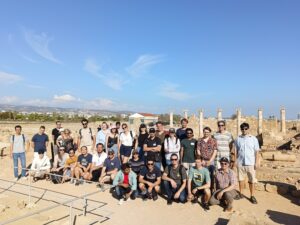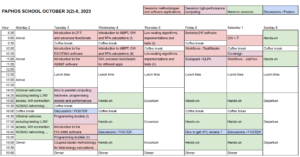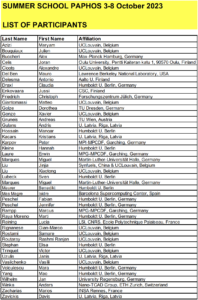This summer school targeted an audience consisting of PhD students and young postdocs, industry-based researchers as well as researchers from countries without tier 0 supercomputing facilities. There were 45 participants, among which 9 ladies. The school covered a wide range of topics to show the challenges and opportunities of exascale computing in ab initio materials science. Lectures provided in-depth information on the fundamentals of advanced exchange-correlation functionals, many-body perturbation theory based on Green functions, and coupled-cluster method applied to solids. Special focus was on libraries and software applications developed in the NOMAD Center of Excellence, for which training was provided, including on LUMI, https://www.lumi-supercomputer.eu/, a powerful pre-exascale European Union high-performance computer. Fundamentals and recent developments in the field were presented by recognized experts, and there was plenty of room for open exchange between the young scientists and established international experts.
On the first day, introductions were given on advanced exchange-correlation functionals, many-body perturbation theory based on Green functions, and supercomputers, followed by introductions about three software applications ABINIT, exciting and FHI-AIMS, whose results were compared for benchmarking purposes. Two of these codes were used subsequently for the hands-on tutorials at the school, namely, ABINIT and exciting . The others days offered a mix of hands-on tutorials, some of them on LUMI, and more advanced lectures on high-performance computing, low-scaling algorithms for Green function calculations, and workflows, as well as poster sessions, discussion sessions (e.g., how to write a successful HPC application), etc. We also visited the Paphos archeological park, Paphos being the ancient capital of Cyprus during roman times.
Feedback from participants was very positive, especially regarding the format of combining information about methods and computing matters. This was a very pedagogical way of doing things, which was really appreciated by the participants because they were able to learn a great deal, especially about running calculations. The extremely agreable weather of Paphos at this time of the year, allowing outdoor swimming (in the sea or at the hotel pool) was also greatly appreciated, and favoured initiating excellent social contacts between participants.
The Web site of the event is at https://www.nomad-coe.eu/paphos-home. All the slides shown during the school have been gathered, and are accessible at https://github.com/nomad-coe/doctoral_school_paphos_2023, together with the detailed program, the poster list, and the list of participants. The program summary is shown below, as well as the list of participants.



